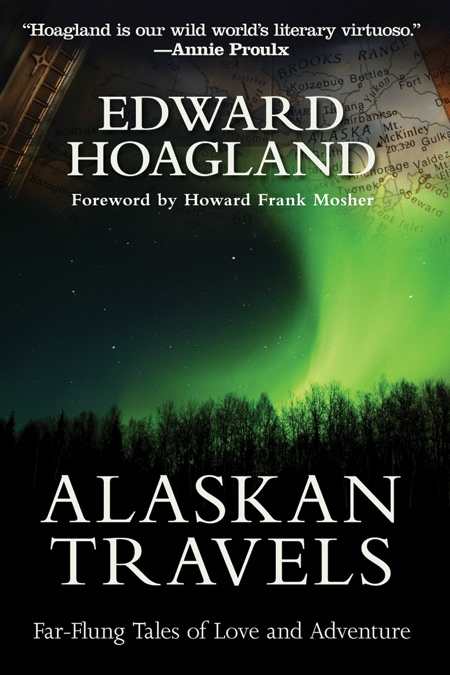Alaskan Travels
Far Flung Tales of Love and Adventure
Reading Edward Hoagland, accomplished naturalist and writer, or rather, losing oneself in Hoagland’s muscular and multitasking prose, one is quickly convinced that the only reliable way to depict a place is by the written word. Alaskan Travels is Hoagland’s account of 1980s Alaska, as he experienced it in the company of his love, a nurse named Linda. Linda is responsible for the state’s TB care, and she travels by bush plane to remote villages and hunting camps to test and monitor patients, dispensing medical care as needed along the way. Her role provides cover for Hoagland, and he makes the most of it, camping on schoolroom floors with her, watching dog races, and conversing with everyone: Inuit, Indians, hunters, Russian Orthodox priests, biologists, and merchants. He interviews developer millionaires and witnesses Linda’s quiet conversations with elderly Indians who are dying of liver cancer in remote cabins far from medical care, but with a view of the tundra and the northern lights.
Hoagland doesn’t so much follow a narrative line, though the love affair threads tenderly through this book, as he layers image and story, roughly sorting this dense prose into chapters with titles such as “Salmon and Dogs.”
The result is painterly, rich, a multisensory awareness of a culture’s varied historical and cultural components. It’s not a static portrait; Hoagland is alert to the impacts of change and the vortex of oil boom money on people, animals, and landscape. He records it close up, recounting the desperate jailbreak, flight, and eventual rescue of an eighteen-year-old Indian named Amos, and at a societal level, noting the epidemic of suicide among young native men caught between old ways and their probable failures in the new economic landscape.
Everywhere are the “entrenched savageries” of the north—drunken beatings, clinics shot up in local feuds, men seeking out confrontations with bears. Violence is as common as the animal carcasses stored under cabin rooftop tarps for winter food supply. Alaska, after all, is both “a destination created out of anger and quests,” and home to the “collateral damage of a culture’s collapse.” Hoagland captures its crazy mix of abundance and scarcity, brutality and warmth, energy and despair. In a brief and poignant closing, he reflects on how as a nation we’ve become inured to natural and cultural destruction and the costs of reinvention. “But what invention,” he asks, “will equal Alaska’s rodeoing salmon runs and ducks like pigeons on the Yukon?”
Hoagland is a necessary part of every public library, and the private libraries of lovers of travel, nature writing, and stimulating prose.
Reviewed by
Teresa Scollon
Disclosure: This article is not an endorsement, but a review. The publisher of this book provided free copies of the book to have their book reviewed by a professional reviewer. No fee was paid by the publisher for this review. Foreword Reviews only recommends books that we love. Foreword Magazine, Inc. is disclosing this in accordance with the Federal Trade Commission’s 16 CFR, Part 255.

